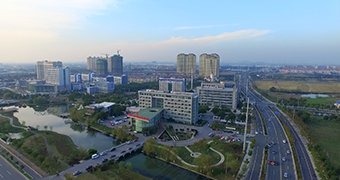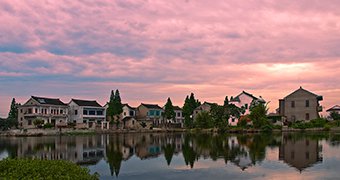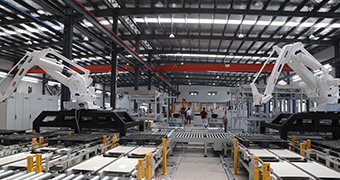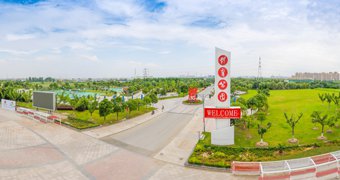The town of Zhoushi is located in the north of Kunshan, where the city borders Taicang and Changshu. It was founded as a result of the merger of the three towns of Zhoushi, Xinzhen and Luyang. Covering an area of 81.56 sq km, it has the two branch offices of Xinzhen and Luyang, 14 administrative villages, 20 communities (including two communities transformed from villages) and one community under construction within its jurisdiction. It is home to a permanent population of 142,300, including 66,500 people who are officially registered as local residents. The southern part of Zhoushi is separated by only a river from the old city center of Kunshan and the Kunshan Economic & Technological Development Zone, while its western part borders the Kunshan New & Hi-tech Industrial Development Zone. One third of its area constitutes part of Kunshan's city center.
The history of Zhoushi dates back to the Spring and Autumn period (771-476 BC), when King Helü of Wu (514-496 BC) built two fortresses here, Donglin and Wei; during the rule of Qin Shi Huang (259-210 BC), it was named "Zhoushu" for the purpose of grain tax collection; during the early years of the Tang Dynasty (618-907), General Yuchi Gong, who was granted Duke of Wu, led an army stationed here.
Zhoushi is a culturally significant place. It is the birthplace of Liang Chenyu (1519-1593), a prominent playwright in the Ming Dynasty, who authored the first play of Kunqu Opera called Huanshaji (Washing the Silken Gauze). This is how Kunqu Opera was born. Often sung in gentle tones with graceful pantomime, Kunqu Opera is considered as the origin of other Chinese opera variations.
Zhoushi boasts an attractive ecological environment shaped by a number of ecological sites, including the Kunshan Ecological Sports Park that is the green lung of Kunshan; Seventy-two Ponds that epitomizes local water landscape; Zhendong Village that hosts Southeast Asian-style architecture; Xinmao City Park; Shibei Farmers' Park; and the scenic belt of the Xintang River.
Zhoushi has developed an advanced economy underpinned by advanced equipment manufacturing and business services. It hosts the Kunshan Advanced Equipment Manufacturing Park under the Torch Program, as well as the Kunshan Commercial Zone, which has been selected by the municipal government of Suzhou as a service hub. Moreover, Zhoushi is also home to over 500 foreign-invested companies and over 8,000 Chinese-invested companies, which are prospering and expanding on this land full of promise and business opportunities.
In recent years, Zhoushi has been aligning its social and economic development with the strategic priorities set by the central government, particularly the spirit of speeches given by President Xi Jinping during his inspection tour of Jiangsu. Guided by the "Four Comprehensives" and "Five Development Concepts" proposed by the central government, and in line with the local government's endeavor to reinvigorate the Kunshan Way, Zhoushi is committed to transforming itself into an advanced equipment manufacturer, an enabling commercial and business zone, a new city in the north of Kunshan, and creating a loving home and a government trusted by the public. Thanks to efforts to optimize its economic structure, enhance its urban environment and strengthen the competence of local officials, Zhoushi has maintained a stable and healthy momentum for social and economic progress. It has received a number of national and provincial honors for its accomplishments, including "National Healthy Town", "National Model Town in Environmental Beauty", "Model Civilized Town of Jiangsu Province", "Model Sports Town of Jiangsu Province". In 2015, Zhoushi reported RMB 21.23 billion in GDP; over RMB 2 billion in fiscal revenue; RMB 55.55 billion in industrial output; RMB 8.2 billion in value added to the service sector; and RMB 6.8 billion in fixed asset investment. In terms of overall competitiveness, it was ranked 37th among China's top 100 towns, six places higher than in 2014.
好多假365平台_365bet手机网址多少_365网站客服电话
Tel: +86 512-57621050
P.C.: 215313




